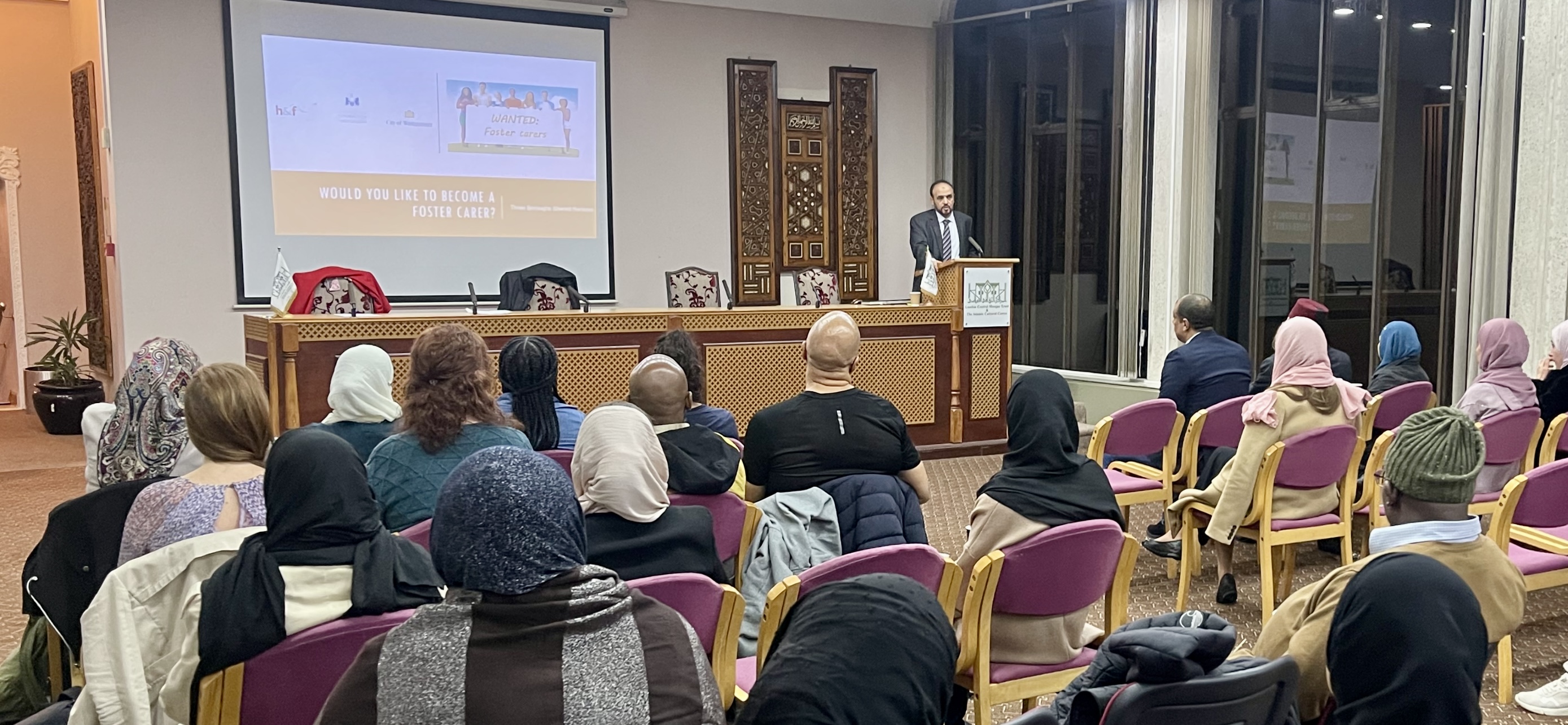Fostering and Adoption in Islam event at London Central Mosque
An event in partnership with Westminster, Kensington & Chelsea & Hammersmith & Fulham councils' Fostering service
An event was held at The Islamic Cultural Centre in Partnership with Westminster, Kensington & Chelsea & Hammersmith & Fulham councils to raise awareness in regards to Fostering from an Islamic perspective on Thursday 2 November 2023.
The event included the Director General Dr Ahmad Al Dubayan speaking from an Islamic perspective and representatives of the councils Amirah Sami & Marsha Rainford-Hay who are responsible for the actual process involved in fostering and adopting.

For more information call 020 8753 1057 or email the council on: fostering@rbkc.gov.uk
Frequently Asked Questions (FAQs)
- As a practising Muslim can I become a foster carer?
- What is the difference between fostering and adoption?
- Am I too old to foster?
- Can I foster if I work?
- Can I foster if I'm single?
- Can I foster if I don't own my house?
- Do I have to be a British Citizen to Foster?
- Do I have to speak English as a first language?
Yes. Our foster carers, like the children in our care, come from a variety of cultural and religious backgrounds. We welcome foster carers from all faiths (and no faith) and would never ask out foster carers to change their values. We do, however, ask that our foster carers offer the same respect to the children they care for, so for example, if they were caring from a child of a different faith to their own they take the time to understand what this means for them and how they can support them to practice their faith. Examples of this may be, if they are Hindu they may not eat Beef or if they are Orthodox Christian they may have fasting days (where they are vegan).
Adoption:
When a child is adopted, they become a part of their adopted family. This means that they change their family name and would no longer be considered as automatically in line for inheritance from their birth family. An adopted child becomes the same to their adoptive parent as a birth child would be; they are their parent and have all the responsibilities that go with that in the eyes of the law (full PR)
Fostering:
When a child is fostered, they become part of the family but keep their own identity. This means their name does not change and their faith, cultural background etc is promoted in line with their parents wishes. As a foster parent, you do not take the place of the child's birth parents and the child may remain in contact with their parents (if it is safe to do so and within their care plan).
Children are fostered for a variety of reasons and may only come into foster care temporarily while parents (and their wider family network) are assessed; if this is the case, they will be placed with foster carers who have 'short term' approval. If after court proceedings it is felt that a child cannot return to their parent's care and there are no suitable family or close friends who are able to care for that child their care plan may be to remain in Long Term Foster Care (this is usually the case for children over the age of 6 who have already formed a strong sense of who they are). Children with this care plan will be placed with foster carers who are approved as Long-Term Foster Carers. As a Long-Term Foster Carer you will care for the children in your care until they are 18 (or beyond if agreed with the local authority and child).
If things go well and both you and the child feel that they should remain in your care you have the opportunity to apply for a Special Guardianship Order (once a child has been with you for over a year). If granted a Special Guardianship Order the Local Authority will no longer be the person with Parental Responsibility for that child, you will. This will mean that you will be able to make decisions for the child going forwards as a parent would, however, you would not be able to change the child's name, put them up for adoption, leave the country for over three months without permission or agree to non-medical surgery without consent from all people with PR.
No. There is no upper age limit for fostering. We ask that all our foster carers consider their physical capabilities when considering the age of the children they would like to foster and would also ask that they consider their age when applying to be long term foster carers (e.g how old might you be when the child is 18 if they are placed with you at 7? How might this impact your ability to foster long term?).
However, we have many foster carers of retirement age who are providing outstanding care for care experienced children. As part of the assessment process we will ask that you have medical with your GP who would hen be able to advise if there could be any issues around fostering children.

Yes. We do not expect our foster carers to give up their employment but do expect foster carers to be able to manage their work around the child in their care's needs. For example, doing the school run, being available after school and helping with homework. Attending meetings and supporting children to go to contact with their family members. If you either work part time or have a flexible employer this should not be an issue.
We do ask that baby foster carers do not work - this is because babies would need constant care. It would be ok if one of the foster carers (in a joint application) was working or if both worked it was on differing shift pattens so that there was always one carer available for the baby in their care.
Yes. If you are single this would pose no issue to you fostering. We would ask that you consider who would be able to provide support (back up carers) in the event you were ill/ had an emergency/work issues etc.
Yes. As long as you are in stable and suitable accommodation. You can be a private renter, homeowner, be in a council property or housing association tenant and still be a foster carer.
No. You need to be a permanent resident (settled status/indefinite leave to remain) in order to be a foster carer.
No. you need to be able to communicate in English well enough to be understood and to be able to understand others. You also need to be able to write English well enough to record the daily logs which are a requirement of all foster carers.

Book Your Nikah With Us!
Click here for all your marriage services. We now offer the larger halls and restaurant bookings to cater for your big day.
MORE INFORMATION >> >>
The Islamic Cultural Centre has established the Commission to guide Muslims in the UK.
Matters relating to religious issues aswell as solving complex inheritance (Mirath) cases, marriage, divorce and islamic arbitration.
MORE INFORMATION >> >>
As we adjust to life in lockdown, many vulnerable in our community need help to get essential supplies. Our staff and volunteers are delivering every day, may Allah reward them and keep them safe.
Please help us to buy the food needed, we'll do our very best to reach as many people as possible, insha-Allah.

